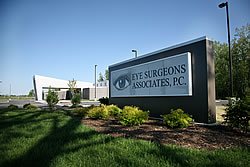ESA Ophthalmologists and Optometrists perform routine eye exams for refractive error (those that need glasses or contacts). What most people don’t realize is that even though they may not be experiencing any vision problems, and think that their vision is “OK”, unfortunately, many ocular diseases in their early stages do not give an obvious warning sign.
In fact, two of the most common causes of blindness, diabetes, and glaucoma, rarely start off with a decreased vision. The two goals of the routine eye exam are to discover any eye problems that need treatment now and to prevent any potential damage to the eye in the future through early detection.
How can you help preserve your vision:
- Know your family history.
- Wear sunglasses/safety glasses.
- Don’t smoke.
- Exercise, eat healthily, maintain a healthy weight.
- Get a dilated eye exam if you are having any vision issues or at the following intervals:
- All children should have their eyes checked by age three. A family history of childhood vision problems, a wandering eye, crossed eyes, or other problems warrant earlier attention.
- Before the age of 20, as recommended by a pediatrician or other physician.
- Between the ages of 20-40, every five years, unless there are visual changes, pain, flashes of light, new floaters or tearing, or if the eye is injured.
- Age 40-64 years: Every 2-4 years.
- Age 65 years or older: Every 1-2 years.
- Persons with diabetes are at risk for several eye disorders, including diabetic retinopathy, glaucoma, and cataracts. These individuals should have eye examinations every year.
- Or as your doctor recommends.




